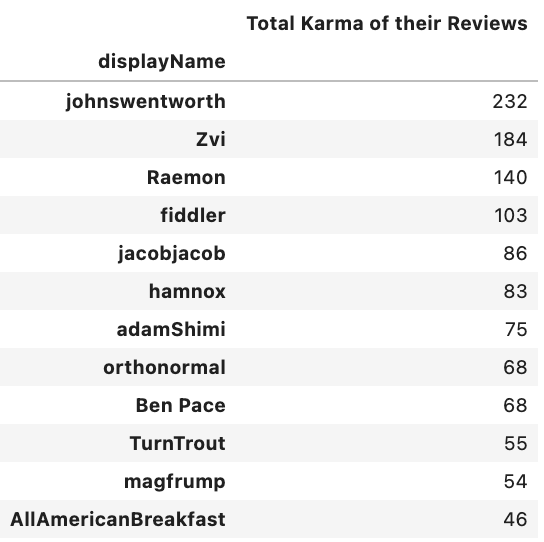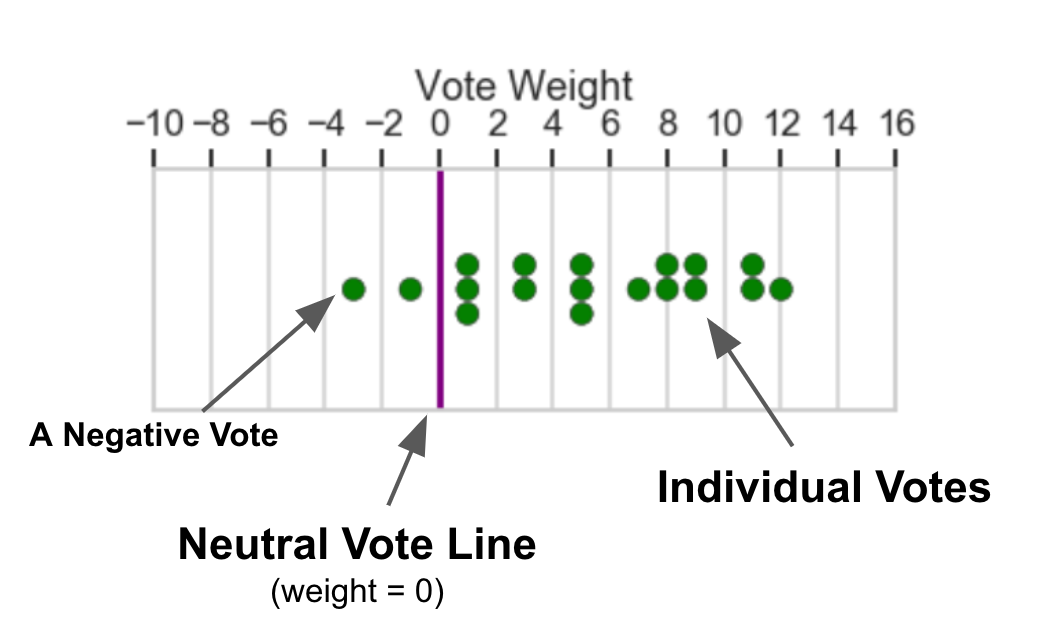You can see the full voting results here: 1000+ karma voters (All voters)
The 2019 Review votes are in!
This year, 88 voters participated, evaluating 116 posts. (Of those voters, 61 had 1000+ karma, and will be weighted more highly in the moderation team's decision of what to include in the Best of 2019 Books)
The LessWrong Moderation team will be reflecting on these results and using them as a major input into "what to include in the 2019 books."
Top Results
The top 15 results from the 1000+ karma users are:
- What failure looks like by Paul Christiano
- Risks from Learned Optimization: Introduction, by evhub, Chris van Merwijk, vlad_m, Joar Skalse and Scott Garrabrant
- The Parable of Predict-O-Matic, by Abram Demski
- Book Review: The Secret Of Our Success, by Scott Alexander
- Being the (Pareto) Best in the World, by Johnswentworth
- Rule Thinkers In, Not Out, by Scott Alexander
- Book summary: Unlocking the Emotional Brain, by Kaj Sotala
- Asymmetric Justice, by Zvi Mowshowitz
- Heads I Win, Tails?—Never Heard of Her; Or, Selective Reporting and the Tragedy of the Green Rationalists, by Zack Davis
- 1960: The Year The Singularity Was Cancelled, by Scott Alexander
- Selection vs Control, by Abram Demski
- You Have About Five Words, by Raymond Arnold
- The Schelling Choice is "Rabbit", not "Stag", by Raymond Arnold
- Noticing Frame Differences, by Raymond Arnold
- "Yes Requires the Possibility of No", by Scott Garrabrant
Top Reviewers
Meanwhile, we also had a lot of great reviews. One of the most valuable things I found about the review process was that it looks at lots of great posts at once, which led me to find connections between them I had previously missed. We'll be doing a more in-depth review of the best reviews later on, but for now, I wanted to shoutout to the people who did a bunch of great review work.
The top reviewers (aggregating the total karma of their review-comments) were:

Some things I particularly appreciated were:
- johnswentworth, Zvi and others providing fairly comprehensive reviews of many different posts, taking stock of how some posts fit together.
- Jacobjacob and magfrump who stuck out in my mind for doing particularly "epistemic spot check" type reviews, which are often more effortful.
Complete Results (1000+ Karma)
You can see the full voting results here: 1000+ karma voters (All voters)
To help users see the spread of the vote data, we've included swarmplot visualizations.
- Only votes with weights between -10 and 16 are plotted. Outliers are in the image captions.
- Gridlines are spaced 2 points apart.
- Concrete illustration: The plot immediately below has 18 votes ranging in strength from -3 to 12.

What does this mean, and what happens now?
(This section written by habryka, previous section written by Ray)
The goals of this review and vote were as follows:
- Create common knowledge about how the LessWrong community feels about various posts and the progress we've made.
- Improve our longterm incentives, feedback, and rewards for authors.
- Help create a highly curated "Best of 2019" Sequence and Book.
Over the next few months we will take the results of this vote and make it into another curated collection of essays, just as we did with last years results, which turned into the "A Map that Reflects the Territory" essay collection.
Voting, review and nomination participation was substantially greater this year than last year (something between a 30% and 80% increase, depending on which metrics you look at), which makes me hopeful about this tradition living on as a core piece of infrastructure for LessWrong. I was worried that participation would fall off after the initial excitement of last year, but I am no longer as worried about that.
Both this year and last year we have also seen little correlation with the vote results and the karma of the posts, which is an important sanity check I have for whether going through all the effort of this review is worth it. If the ranking was basically just the same as the karma scores of the post, then we wouldn't be getting much information out of the review. But as it stands, I trust the results of this review much more than I would trust someone just pressing the "sort by karma" button on the all-posts page, and I think as the site and community continues to grow, the importance of the robustness of the review will only grow.
Thank you all for participating in this year's review. I am pleased with results, and brimming with ideas for the new set of books that I am looking forward to implementing, and I think the above is already a valuable resource if someone wants to decide how to best catch up with all the great writing here on the site.



















































































































Yeah, looking at this again, I notice that the post probably failed to communicate my true reason. I think my true reason is something like:
I think that drawing a boundary around good and bad behavior is very hard. Luckily, we don't have to draw a boundary between good and bad behavior, we need to draw a boundary that has bad behavior on the outside, and *enough* good behavior on the inside to bootstrap something that can get us through the X-risk. Any distinction between good and bad behavior with any nuance seems very hard to me. However the boundary of "just think about how to make (better transistors and scanning tech and quantum computers or whatever) and don't even start thinking about (humans or agency or the world or whatever)" seems like it might be carving reality at the joints enough for us to be able to watch a system that is much stronger than us and know that it is not misbehaving.
i.e., I think my true reason is not that all reasoning about humans is dangerous, but that it seems very difficult to separate out safe reasoning about humans from dangerous reasoning about humans, and it seems more possible to separate out dangerous reasoning about humans from some sufficiently powerful subset of safe reasoning (but it seems likely that that subset needs to have humans on the outside).